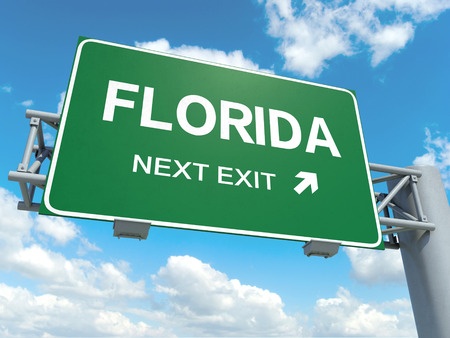What you should know before driving in Florida
November 28, 2014 | Category: Automobile Accidents | ShareWith the early winter and some areas getting as much as 6 feet of snow in one day, many people may be thinking of visiting, and possibly relocating to, Florida. We expect that our tourist population will increase dramatically this year. Also, the Florida Department of Motor Vehicles estimates, based upon applications for Florida drivers' licenses, that on average, 1,000 individuals or families are moving to Florida every day of the year.
 States have different motor vehicle laws, and it is important to become familiar with a state's law before "crossing the border". When driving in Florida, as in any other state, drivers need to follow the state's motor vehicles laws. A lack of knowledge of a state's laws is not accepted as an excuse for breaking the law.
States have different motor vehicle laws, and it is important to become familiar with a state's law before "crossing the border". When driving in Florida, as in any other state, drivers need to follow the state's motor vehicles laws. A lack of knowledge of a state's laws is not accepted as an excuse for breaking the law.
In an effort to assist drivers new to Florida, we would like to review some of the Florida Department of Highway Safety and Motor Vehicles' "Visiting Florida - Frequently Asked Questions".
Visitors from another country -
In order to drive in Florida foreign visitors wishing to drive here must have a valid driver license in their possession in his or her name from their country of residence. Car rental agencies may have their own additional rules, so it is recommended that foreign visitors check with the individual rental agencies.
If on vacation, can a driver drive on his/her out-of-state learner's license or permit?
Although Florida will honor another state's license/permit while a driver is on vacation here, the driver must abide by Florida's learner's permit restrictions. These are as follows:
Drivers with a leaner's license may only drive during daylight hours during the first three months after issuance and until 10 p.m. thereafter, and always with a licensed driver who is at least 21 years old and occupies the front passenger seat.
More information on this will be found on the state's Drive With Care website.
When must a driver get a Florida driver's license?
Within 30 days of becoming a resident as evidenced by:
- Children's enrollment in school, or
- Registration to vote, or
- Filing for a homestead exemption, or
- Accepting employment, or
- Residing in Florida for more than six consecutive months.
What are the child restraint requirements in Florida?
Operators of every motor vehicle driven on Florida's roads must provide for the protection of any child, 5 years of age or younger, by using a crash-tested, federally approved car seat. Children up to 3 years old must be in a separate carrier or a vehicle manufacturer's integrated child seat. Children aged 4 through 5,must be in a separate carrier, an integrated child seat, or a seat belt may be used. There is further information on child restraint requirements on the Florida Senate website.
What are the seat belt requirements in Florida?
Front seat occupants must buckle up. In Florida, it is unlawful for any person to operate a motor vehicle in the state unless each passenger of the vehicle under the age of 18 is restrained by a safety belt or child restraint device pursuant to Florida Statute 316.613. In addition, it is unlawful for any personal 18 or older to be a passenger in the front seat of a motor vehicle unless the person is restrained by a safety belt with the vehicle is in motion.
If drivers have disabled parking permits, should drivers bring them with them when visiting Florida?
Yes. Florida honors any special license plates or parking permits issued to a disabled person including those issued by a foreign country that displays the international symbol of accessibility.
What is the "Move Over Law"?
The Florida "Move Over Law" was enacted in 2002 to protect law enforcement and emergency personnel when parked at the side of Florida's two-lane roadways with flashing lights. On July 1, 2014, the law was amended to include sanitation vehicles and utility service vehicles. On two-lane roads, drivers are required to slow to a speed that is 20 miles per hour less than the posted speed limit. If the speed limit is 20 miles per hour or less, the driver must slow down to five miles per hour. On the interstate or multiple-laned roadways, drivers must vacate the lane closest to the emergency, law enforcement, sanitation or utility service vehicles as soon as it is safe to do so.
"If you are expecting out-of-state company who intend to drive in Florida or you know someone new to our state, we suggest sharing this blog with them. Also, you may direct them to the links we have provided here for more information," says Southwest Florida Personal Injury Attorney, Randall Spivey of Spivey Law Firm, Personal Injury Attorneys, P.A.
Southwest Florida Personal Injury Attorney, Randall L. Spivey is a Board Certified Trial Attorney – the highest recognition for competence bestowed by the Florida Bar and a distinction earned by just one (1%) percent of Florida attorneys. He has handled over 2,000 personal injury and wrongful death cases throughout Florida. For a free and confidential consultation to discuss your legal rights, contact the Spivey Law Firm, Personal Injury Attorneys, P.A., in Lee County at 239.337.7483 or toll free at 1.888.477.4839,or by email to Randall@SpiveyLaw.com. Visit SpiveyLaw.com for more information. You can contact Spivey Law Firm, Personal Injury Attorneys, P.A.in Charlotte County at 941.764.7748 and in Collier County 239.793.7748.

